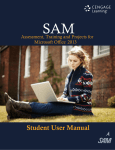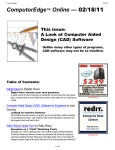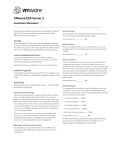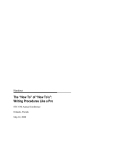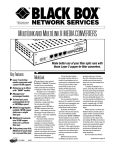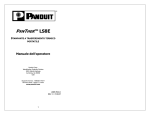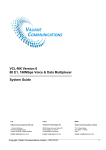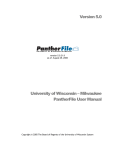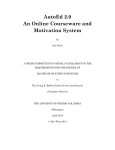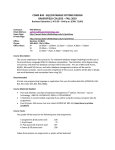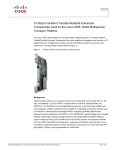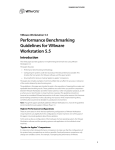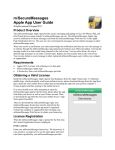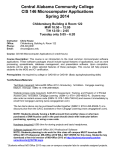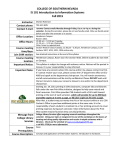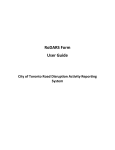Download Required TEXTS/RESOURCES Course Goals
Transcript
English 205: Business Writing Section 228 (Online Web) Instructor: Dr. Sally Stanton Semester: Fall 2011 Email: [email protected] UWM Phone: 414-229-5007 Home Office: 414-231-9228 (bus. hrs) Course Syllabus Course Desire 2 Learn (D2L) web site: https:// uwm.courses.wisconsin.edu/ Office Hours: Online or by appointment Office: Curtin 288 Required TEXTS/RESOURCES Alred, Gerald, et al. The Business Writer’s Handbook, 9th edition. Guffey, Mary Ellen. Business Communication: Process and Product, 7th edition. The text E-book is included when you purchase APLIA, an online homework program (when you purchase Aplia, you get both Aplia and the E-book). You MUST purchase Aplia. Readings, videos, and instructional handouts posted on D2L A dictionary and thesaurus of your choice. A constructive attitude. Access to a computer and a reliable Internet connection!! 1 2 4 5 6 7 Course Goals English 205 aims to prepare you to be an effective workplace communicator, which is a key factor in one’s professional success, given the high proportion of interactions and decisions that require written communication in business environments. The course helps you to develop knowledge and skills needed to write successfully and to understand and apply the rhetorical principles guiding and underlying workplace communication practices. While sometimes hypothetical, most assignments will be based upon ― real-world‖ situations and cases. Ultimately, they all are intended to prepare you to write for audiences and purposes in virtually any business context. During the semester, this course will introduce you to the processes and products of, as well as some basic issues, strategies, and genres of, business writing, including • • • • • • • • • Analyzing contexts, purposes, and audiences to determine appropriate writing choices Addressing social issues related to writing, such as ethics, politics, gender, and culture Defining, analyzing, and attempting to resolve workplace writing problems Understanding writing as a continuum of researching, drafting, reviewing, revising, and editing. Developing an effective professional tone and style Designing documents and incorporating appropriate visual elements for effective communication Writing various business documents, such as emails, memos, proposals, letters, and reports Providing peers with useful feedback on their writing and applying feedback from peers to your own document drafts Using digital technologies for composition and communication Stanton_Syllabus_English 205_Fall 2011 1 Required Digital/Electronic Literacy Students taking this course must have the ability to: • Open, edit, save, and store files in WORD PROCESSING format. • Create, send, receive, and read email, including attachments, using UWM email. • You must use your UWM email account and no other for this course. • Use Desire2Learn (D2L) and other web-based applications to read and view assignments, participate in discussions, and upload documents for grading. • Use the most updated version of Adobe® Reader software to read course documents. This is a free download available at http://www.adobe.com/products/acrobat/readstep2.html • Use the help files as needed for D2L at: https://uwm.courses.wisconsin.edu/. • Access the UWM library database remotely via www.uwm.edu Course Policies Basic Expectations • • • • Complete all reading and writing assignments by their due dates. o Assignments are due on the date listed on the Weekly Schedule (see Assignments section of Syllabus). They are considered late thereafter. I will grant extensions only under serious circumstances and only if you contact me prior to the due date. o Note: Your formal writing assignments will be docked one-third of a letter grade for each day (24-hr period) they are late. Thus, an assignment submitted two days late (submitted Tuesday when due on Sunday) would be dropped from an A- to a B. o PLEASE avoid submitting late work. It creates extra work for both of us and it’s unprofessional. If you must submit work late, please ALSO send me a brief email notification of the upload to the Dropbox. D2L does not automatically notify instructors of your uploaded documents. Participate regularly and frequently, with respect for the ideas of others, the newness of the material to everyone in the class, and the need for patience, patience, patience. Show respect through good online etiquette or ―n etiquette.‖ (See D2L handouts on this topic.) Take appropriate steps to avoid computer, printer, or media failure o Complete all work in advance of the due date for a security margin. o Save your work frequently!!! o Save your work to your Pantherfile account to prevent risk of disk failure. o Make backup copies of your work on a CD, flash drive, or the Web. o Make a hard copy (e.g., a paper copy) of your work before quitting, even if you are only working on an outline or rough draft. Hard drives can AND DO crash at any moment! o Remember, you have access to numerous campus computer labs and most public libraries also make computers available to the public. Having your computer lost, stolen, or defunct is not an acceptable excuse for late, incomplete, or missing work. BACK UP YOUR WORK! Stanton_Syllabus_English 205_Fall 2011 2 Prerequisites To enroll in English 205, you must have completed the English Proficiency Requirement and be of sophomore C‖ or better in English 102 (or an equivalent second-semester standing. You must also have earned a grade of ― college composition course) or a score of ― 4‖ or higher on the English Placement Test. English 205 may not be taken credit/no credit. Note: You are required to promptly show evidence of having met the prerequisites for the course (grade report, transcript, or test score form) if you enroll in the course after the initial registration period or if the records provided to your instructor by the Registrar’s Office are incomplete. **Administrative Drop** Our class begins on Tuesday, September 6. Students who are registered but who do not submit and participate in the first week’s assignments and activities by Tuesday, September 13, 2011 at 11:00 p.m. will be administratively dropped from this course. If you lack a course prerequisite, you may be administratively dropped from—or be required to drop—the class. Drop the class as soon as you know you can’t remain in the class. It is your responsibility to drop classes for which you don’t meet published prerequisites or that you do not plan to attend. Don’t wait for the English Department to drop you, as fees for dropped classes are based on the date you drop the class online via PAWS or the date your drop form is submitted to Enrollment Services, Mellencamp 274. (For more information, see ― Registration Policies,‖ Department of Enrollment Services, http://www3.uwm.edu/des/web/registration/policies.cfm .) Please be courteous and inform your instructor and the class that you have left an online course (explanations are unnecessary, but notification is good business practice). Important Dates September 19 is the deadline for adding or dropping a course without penalty. You can access a fillable PDF add/drop form at http://www4.uwm.edu/des/upload/adddrop_fillable.pdf October 3 is the last day to drop or withdraw from full semester courses (with written instructor permission) without a ― W‖ on your record (but you will pay a fee). October 28 is the last day to drop or withdraw – period. (But you’ll need a valid reason and instructor permission. Also, you will not receive any refund, you’ll pay a fee, and you’ll have a ― W‖ on your record.) Disability Accommodations If you need specific accommodations to complete course requirements, notify me during the first week of the semester— particularly if you work with an advisor at the Student Accessibility Center (SAC), in which case you will need to provide me with your VISA statement – please scan and email it to me or or request an electronic copy from the Student Accessibility Center (SAC). Accommodations must be approved through the SAC. Late notification may cause the requested accommodations to be unavailable. The SAC is located in Mitchell Hall 112. Plagiarism Plagiarism is cause for a failing grade on an assignment, failure of the course, and possible expulsion from the university. Academic integrity is vital to this course. Plagiarism means representing the work (wording, organization, ideas) of someone else as your own without careful and accurate acknowledgment. Please be extremely careful to avoid the temptation of downloading material from electronic sources. Stanton_Syllabus_English 205_Fall 2011 3 All material from electronic and print sources must be clearly and carefully documented. Students who engage in plagiarism are subject to the UW System Academic Misconduct Regulations as described in the guidelines of UW System Chapter 14 and UWM Faculty Document 1686. Those sanctions include a failing grade for that assignment, a failing grade for the course, suspension, and expulsion from the university. Whenever you quote, paraphrase, or summarize another writer’s work, you must inform your readers of the source of those words or ideas. If you have any concerns about plagiarizing and how to avoid it, please communicate with me about your concerns. General Information about Homework Assignments 1. THIS IS NOT A SELF PACED COURSE. Other students in the course will depend upon your participation just as they do in a physical classroom. You will have weekly assignments that require you to read the texts, complete online homework assignments in Aplia, read articles and watch videos, and prepare writings to post to one or more discussion forums. In addition, each week carries deadlines for all or portions of your formal and informal writing assignments. Refer frequently to the Weekly Schedule for a listing of assignments and assignment deadlines. 2. Assignments are a serious obligation from which you can reap great rewards. Use them to practice thinking your way into and through problems. They should generate and sustain online discussion, helping you test your ideas before finalizing them in projects. 3. A course week covers Monday through Sunday. The due date for most assignments is the last day of a course week on Sunday by 11:00 p.m., unless otherwise stipulated. Exceptions: • • • The Introductions and Netiquette Discussion (instructions are posted as a Message from Sally Stanton in the respective discussion forums in the Discussions area of the D2L site). Please post to the Introductions discussions BY the end of Week 1 (as defined by the week designation on the Weekly Schedule) of the course (by 11:00 p.m. on Sunday). Please post to the Netiquette Discussion BY the end of Week 2 (by 11:00 p.m. on Sunday). Saving Files to Pantherfile All UWM students have FREE access to Web storage space via Pantherfile. This is an ideal place for you to save your files in case your computer crashes, you lose your flash drive, or your external media fails to work. You can access this storage space from any computer anywhere in the world with a browser and Internet connection. To learn about Pantherfile and begin using it, do the following: 1) Open your browser. 2) Go to the UWM homepage. 3) Choose Pantherfile from the Quicklinks dropdown list and click Go. 4) A link to a video introduction to Pantherfile can be found on the right side of this page. Other help files include a PDF user’s manual, an online tutorial, and help files. 5) Pantherfile log-in is located on the left side of this page. Your Pantherlink username and password are used to log-in. You can use Pantherfile this way from any web browser. To use drag-and-drop on your home computer, you can create a Pantherfile Web folder on your desktop. See the user help files for instructions. Note: Remaining in this course after you have received and read these course policies means that you understand the policies and agree to abide by them for the duration of the course. Stanton_Syllabus_English 205_Fall 2011 4 Grades Your grades will emphasize the written elements of your work, professionalism in interactions with peers, and satisfactory completion of assignments. Professionalism includes leadership, attitude, communication, improvement, and intellectual honesty, all of which can lead to promotion and other successes; improperly managed, these elements can have negative effects on a career. Grades will be calculated by averaging together separate grades in three areas: 1. 2. 3. Formal Writing: in-depth projects such as memos, letters, proposals, reports, and/or presentations Informal Writing: assigned online discussions and the scavenger hunt orientation assignment Aplia: weekly homework assignments completed online Grades for formal writing assignments will be posted on D2L. Grades for informal writing assignments will not be posted on D2L, as these grades will reflect your level of participation and professionalism in discussions. Your Aplia homework grades and Write Experience program (WE) feedback will be immediately available from within the Aplia or WE websites (Aplia points will be converted at the end of the semester). Feel free to estimate your grade throughout the semester, but please do not ask me what your grade is. It will not be determined until the end. Please note: Although it is technically possible to accumulate sufficient points to pass the course without completing all assignments, do not expect to do so. All written assignments must be submitted in order to earn a passing grade. Submit every assignment completed to the best of your ability. The course is structured such that falling behind in any one of the three areas listed above will significantly and negatively affect your grade. If you begin to fall behind, it’s best to re-assess your continued enrollment in the course. If you’ve overcommitted yourself, take responsibility for that and consciously choose a wise course of action. Contact me any time to discuss any issues affecting your work in the class. The earlier you do this, the better! I’m generally unresponsive to 11th hour pleas about how busy you are in your work, life, and other classes. I’m here to help you succeed, but I can’t do that if I don’t know you’re having problems. Stanton_Syllabus_English 205_Fall 2011 5 Summary of English 205 Writing Assignments Category Formal Writing Assignments (40%) Drafted in Write Experience with final submission to D2L Informal Writing Assignments (Discussion and Other Work) (30%) Completed and submitted in D2L Aplia (30%) (completed and submitted via Aplia website) Assignments Assignment #1 (Memo) Assignment #2 (Email) Assignment # 3 (Proposal) Assignment # 4 (Letter) Pecha Kucha presentation Total Points: 1000 100 100 100 100 150 Introductions, Netiquette, Scavenger Hunt, Homework Discussion Graded ― Acceptable‖ or ― Unacceptable‖ 150 Weekly online exercises associated with chapter readings in the Guffey text 300 Discussions/Informal Writing Contract Informal does not mean sloppy, careless, inaccurate, or poorly proofread work. Informal writing occurs between peers and colleagues in the workplace; formal writing is typically designated for superiors, customers, vendors, and the public. In this class, online discussion postings and similar assignments are defined as informal writing, and I use a grading contract to assess this work. A grading contract is an advantage to students. Because your evaluation doesn’t stand or fall on a single assessment, your grade more accurately reflects the quality of your work over time, rather than how you do on a particular day or at a particular task. What’s more, this contract emphasizes the quality of your understanding and interaction with the texts and each other over less-relevant measures. Informal writing assignments will be assessed as Acceptable or Unacceptable. You will be notified if your work is Unacceptable; otherwise assume that completion = Acceptable. Acceptable On-task Actively engaged/cites readings/reflective Substantive/meets word # requirements On time Stanton_Syllabus_English 205_Fall 2011 Unacceptable Sloppy, careless, rushed, mechanical errors Factually or logically inaccurate/unsupported Non-substantive/too short Late 6 Grading of Assignments Formal Writing Assignments The formal writing assignments listed above in the summary table will be graded on an A-F scale. Detailed instructions for completing each assignment can be downloaded from the Content area in D2L. Your grade will reflect the quality of writing and research, not the time and effort expended, and will be based on how you will be expected to write in a business context. Failure to turn in drafts will reduce your final grade by one letter or more, at my discretion. I will assume the role of a manager, applying the following general distinctions between ― A‖ work, ― B‖ work, and so on, to your writing: A = Manager or clients would be impressed and remember the work when a promotion or contract is discussed. An "A" is reserved for work that clearly fulfills the requirements or criteria for a given assignment. These assignments must be better than the work of most students in the course. B = Manager or clients would be satisfied with the job but not especially impressed. A "B" indicates some lack or deficiency in one key area. For example, a "B" would be given to an assignment that overlooks a specified criterion, has a less than professional visual quality, or was not edited or proofread thoroughly. C = Manager or clients would be disappointed and ask you to revise or rewrite sections before allowing outsiders to see the work. A "C" indicates more substantial shortcomings in the areas discussed above. D = Manager or clients would be troubled by the poor quality of the work. A "D" indicates that there are profound weaknesses in all areas of the document. F = Manager or clients would start looking for someone to replace you. How effectively you meet these criteria will depend on an assignment's form or overall appearance, visual appeal, and adherence to the models provided; content, which includes grammar/punctuation, tone/style, and sentence/paragraph development and organization; and adherence to the principles discussed in the assigned readings. Although I will be attentive to an assignment's form, the content of the assignment will always play a larger part in determining the final grade. A general assessment rubric used to evaluate your work will be provided. Informal Writing Assignments These assignments include an orientation Scavenger Hunt assignment (submit to Dropbox) which introduces you to the resources available on the course site, and several discussion forums: 1. Introductions Discussion (Post entry by end of Week 1) 2. Netiquette Discussion (Post entry by end of Week 2) 3. Weekly Homework Discussion (post weekly on Sunday night, ongoing throughout the semester) All students will participate in the Introductions, Netiquette, and Weekly Homework discussions in an assigned small group of 8-10 students. Stanton_Syllabus_English 205_Fall 2011 7 Weekly Homework Discussions All students must participate in the weekly homework discussions. Although the instructor will post a question for discussion, this is a student-led discussion, where you generate responses and additional discussion topics related to the course content you are studying and working with during each week. Students can either post a topic or reply to a topic to receive credit. Please keep in mind that even an informal discussion in the workplace is an opportunity to practice your business communication skills. Aplia Homework Exercises When you purchase Business Communication: Process and Product 7th edition E-book, you also receive a subscription to Aplia included in the price. If you purchase only the print version of the text, you must also purchase a subscription to Aplia. You can purchase the subscription directly from Cengage Publishers www.cengagebrain.com). The bookstore does not always follow instructor’s directions on textbook and course resources. Be advised that the UWM bookstore will not ― buy back‖ the Aplia card if you have already paid for and used it. Therefore, if you purchase from the bookstore, do not register your Aplia access card until you are absolutely sure you will remain in the course. If you purchase it online from Cengage, you are allowed full access to Aplia for a trial period of about three weeks before you are required to make payment. Don’t pay for Aplia until you are certain you will remain in the course. You will need the Aplia course key to enter the Aplia portion of the site: (TBA) The Aplia website provides an online homework system which automatically grades your work and gives you instant feedback on how well you are learning, understanding, and applying course concepts. It will help you understand where you need additional study, review, and practice to become a good business communicator. By completing the weekly assignments in Aplia, you’ll be learning about the process of business writing and how to accomplish it effectively, step by step. You’ll also be learning about the products of business writing – what constitutes excellent, effective business communication – letters, memos, emails, reports and more. Finally, it will help you review and improve basic grammar and mechanics skills. Student feedback on Aplia is quite positive – it really does improve your writing. You will then be prepared to apply the concepts and techniques for business writing that you have learned to your formal and informal writing assignments, which I will grade and return through D2L. Aplia assignments are due each week on Sunday night at 11:00 p.m. Keeping up with the assigned reading and submitting these assignments is very important to your progress in this course. You should log in to the Aplia website immediately when the course begins to become familiar with Aplia and how it works. A detailed schedule of readings and Aplia exercises specifically for this course is available at the Aplia website when you log in. You must complete several Aplia assignments during the first few course weeks that are specifically designed to orient you and help you assess your writing skills and knowledge. You must complete these assignments to remain in the course and to pass it. IMPORTANT: If you join the course late, please complete the introductory Aplia assignments within one week of adding the course, while also completing the current weeks’ assignment. A student instruction sheet and a PowerPoint presentation about accessing Aplia are provided on our course D2L site. Stanton_Syllabus_English 205_Fall 2011 8 You can link to the Aplia site by clicking on the CengageBrain button in D2L. Think of D2L as our primary course site, where you’ll participate in discussions, find additional assigned readings, handouts, and assignment prompts, and submit your writing assignments. Think of Aplia as a secondary site where you go to complete weekly homework exercises tied to your Guffey/Loewy text readings. “Write Experience” Draft Review Program Like Aplia, Write Experience is an online program for learning about business writing. WE is designed to assess drafts of your business writing assignments and provide you with instant feedback on content, mechanics, style, and strategy. It does not assess the form (format and document design) of your assignments; your instructor will do that when your final assignments are submitted to D2L. You may submit up to three drafts to WE for assessment in the program. Your fourth submission must be made by the posted due date and will be considered your final submission for content purposes. By the same due date you must also submit your assignment to the appropriate D2L dropbox as a word-processed document formatted correctly and effectively in appropriate business style and format. Your final grade for these assignments will be posted in D2L once your instructor has graded them. During the first two weeks of class, you are encouraged to become familiar with WE by completing a practice document. This practice document will not be graded by the instructor nor count toward your final grade. You will need the Write Experience course key to access the program: (TBA) Course Grading Scale Final grades for this course will be based on the following scale: A AB+ B BC+ 93 and up 90-92 87-89 83-86 80-82 77-79 C CD+ D DF 73-76 70-72 67-69 63-66 60-62 59 and below VERY, VERY IMPORTANT REMINDERS Work commitments are generally not appropriate justifications for late or missed assignments, especially if this becomes a pattern. Occasionally, we all have life events that unexpectedly interfere with our commitments. Most or all of the students enrolled in an online course, just like many attending a classroom-based course, have families, full-time jobs, and many other responsibilities. Your classmates are under the same time constraints you experience. Everyone is busy and overwhelmed. How well you manage your multiple priorities is the key. ― Attend‖ this course by logging in daily to keep up with your commitments. Keep an eye on the calendar. Read the weekly announcements. ― Talk‖ with your classmates in the discussion areas frequently. Balance your work, family, and school commitments carefully. Keep in mind what is most important to you. If you experience conflicts, look at what you can do differently. Ask for help. Stanton_Syllabus_English 205_FALL 2011 10









